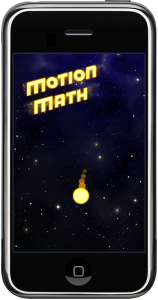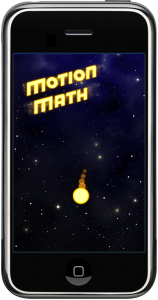Among those nifty ideas presenting today is Motion Math, a startup creating a suite of educational apps intended to give kids a more interactive (and fun) way to learn challenging topics. The startup wants to leverage the engaging physical aspects of the mobile experience, like the touch interface and accelerometer, to create that interactive quality which will help kids internalize what they’re learning.
The iOS app’s gameplay (and at this point the only one in the suite that is currently live) has the gamer follow a bouncing star, prompting answers to mathematical questions and equivalencies, while following the number line. The game focuses primarily on fractions, as the startup is of the mind that fractions are a critical foundation in early math.
Thus, the game teaches kids how to turn fractions into percentages, then into decimals, and so on; the idea being that, the more young people are able to solidify these important, fundamental mathematical concepts in their heads, the likelier they will be to do well in future mathematical and academic pursuits. Not to mention, fractions are a pain in the ass, and many kids struggle to learn how to add and subtract them, etc.
The startup’s founders, Jacob Klein and Gabriel Adauto, are both graduates of the learning, design, and technology graduate program at the Stanford School of Education. At Stanford, they studied a theory called “embodied cognitionâ€, which is essentially the belief that the mind and body interact on the fly as a single entity, and movement is based not on internal reactions, but the immediate interaction with physical environment. What does that mean? Well, it’s essentially academic research that gave birth to one of the startup’s principle ideas, which is that physical experience of intellectual data — like fractions — leads to increased understanding and digestion.
As such, the gameplay experience is important to Motion Math, and the founders said that they want there to be no separation between that gameplay and the learning. To me, this sounds like a very clever way to trick kids into enjoying math games. Because kids love tablets, and they love phones — almost as much as they love stealing them from their parents. So, trying a tablet app — that involves physical interaction — and makes learning fun? I think kids might be into that idea. And parents might be into the fact that the app is supported by scientific educational research. There’s a bit more thought behind Motion Math than, say, The Count from Sesame Street. (As much as we love him.)
The second half of Motion Math’s business will be the aggregation of the data it collects from users playing the game. The startup plans to track scores, trends, or, say, fractions that are problematic, and parents will be able to follow their child’s progress in a dashboard. “We’re currently using Flurry for our analytics, we’ll soon build our own data collection platform for drawing insights on individual and aggregate learning and for giving feedback to kids, parents, and teachersâ€, Klein told me. “Many parents are very curious about how their kids are progressing – we already have very rich dataâ€.
Klein also told me that they had been experimenting with price points for the iPhone, between $1 and $2, and between $3 and $4 for the iPad. Android apps will be coming later this year.
Motion Math is an interesting concept, and I look forward to the startup’s future releases. After all, it’s about time someone started thinking of the children. Via: techcrunch.com
Related, Imp0rtant, Recent P0sts;
– Apple to Fix Your Blurry iPhone Pictures With Multiple Flash Pulses
– Fring Announces that Group Video Chat is Coming to the iPhone
– iOS 5 packs Photo Stream social feature into Photos.app?
– Apptitude Uses Facebook To Figure Out Which iPhone Apps Your Friends Are Using
– Delete Apps From Home Screen with CyDelete [Cydia Tweak]
– Native Turn-By-Turn Voice Navigation Coming To iOS!
F0r M0re UpDaTing:
Be 0ne 0f My New F0ll0wers 0n Twitter,
0ne 0f My New Fan 0n FaceB00k,
And Here Is The Feeds.





